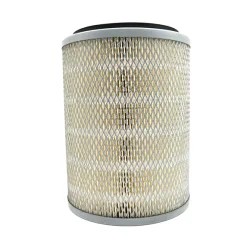What does an air filter do for you?
2023-10-21
An air filter serves several important functions that benefit both individuals and the environment. Here's what an air filter does for you:
1. Removes Particulate Matter: Air filters are designed to capture and remove various types of airborne particulate matter, including dust, pollen, pet dander, mold spores, and other allergens. By doing so, they improve indoor air quality and reduce the potential for allergic reactions and respiratory problems.
2. Filters Out Pollutants: Air filters can also capture harmful pollutants such as volatile organic compounds (VOCs), smoke, and fine particulate matter (PM2.5) from sources like vehicle exhaust and industrial emissions. This helps reduce exposure to air pollutants associated with health issues.
3. Captures Microorganisms: High-efficiency particulate air (HEPA) filters are effective at trapping microorganisms like bacteria, viruses, and fungi, which can reduce the risk of illness and help maintain a healthier living environment.
4. Reduces Odors: Some air filters, particularly those with activated carbon or charcoal, can help reduce unpleasant odors from cooking, pets, or other sources, making the indoor environment more pleasant.
5. Extends Appliance Life: Air filters are used in HVAC (heating, ventilation, and air conditioning) systems. By capturing dust and particles, they help prevent the accumulation of debris on internal components, which can extend the life of HVAC systems and improve their efficiency.
6. Energy Efficiency: Clean air filters in HVAC systems also contribute to energy efficiency. A clogged filter can impede airflow, making the system work harder and use more energy. Regularly changing or cleaning filters can help save on energy costs.
7. Reduces Allergies and Respiratory Issues: By removing allergens and pollutants from the air, air filters can provide relief to individuals who suffer from allergies, asthma, or other respiratory conditions, allowing them to breathe more comfortably and sleep better.
8. Environmental Benefits: Improved indoor air quality also has environmental benefits. By reducing the need for air fresheners, aerosols, and other products that emit volatile compounds, air filters contribute to lower indoor pollution levels and less waste.
9. Protection of Electronics: In certain environments, air filters are used to protect sensitive electronic equipment from dust and contamination, ensuring optimal performance and prolonging the life of the equipment.
10. Compliance with Regulations: In industrial and commercial settings, air filters are often used to meet environmental regulations and ensure that emissions from industrial processes are within acceptable limits.
Regularly maintaining and replacing air filters in HVAC systems and air purifiers is essential to ensure their effectiveness. Depending on the type of filter and the level of air pollution in your environment, air filters typically need to be replaced or cleaned at regular intervals to continue providing the above benefits.



